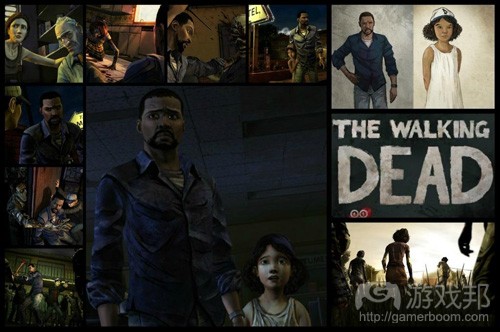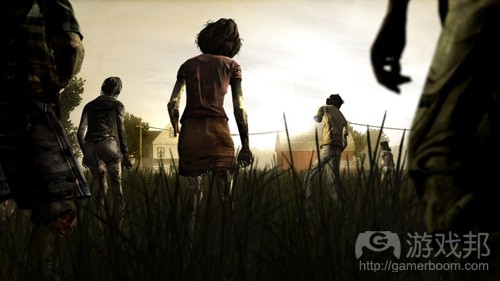探讨《行尸走肉》的选择错觉对玩家的影响
作者:Ben Ebell
通常,游戏中的选择系统总会涉及“道德”层面,这对许多玩家而言是个棘手的问题。将其添加到叙述情节,可以让玩家体会到身临其境或者在游戏世界中的重要性,让他们觉得自己的一举一动富有意义,而且游戏故事是为他们量身定做的。
毫无疑问,这就是《质量效应》系列成功的原因,它并不仅仅是因极高的产品价值而取胜。
然而投资制作这样的游戏机制存在一定的风险。游戏中添加及追踪越多的变量,它就越难赋予选择的重要性。但是,Telltale的《行尸走肉》表明了错觉选择比你想象中的更重要。首先,《质量效应3》引发的风波证明了不按计划行事的结局。它并未重新塑造情节,而是引入前作的选择,给游戏带来画蛇添足之感。更糟糕的是,游戏为简化故事而草草掠过或完全忽略一些重要、复杂的决定。在《质量效应1》中,玩家的任务是决定整个种族的命运。如果玩家饶恕了最后的Rachni,那么这个王后会在《质量效应2》中出现,提醒玩家她不会忘记自己曾经获救。而在《质量效应3》中,你会发现即使杀掉了最后的王后,仍然会出现另一个人物取代她的地位,开发商BioWare实际上只更改了1-2行的对话,就开脱了为游戏同时设置两种可能结果的责任。此举显然会让那些认为自己的选择富有意义的玩家感到不快。
Telltale制作的五章系列的《行尸走肉》绝对可以让玩家体验到乐趣。作为与《暴雨》或Telltale其它作品一脉相承的第三人称冒险游戏,《行尸走肉》一直坚持玩家选择的意义性以及同角色互动的重要性。
在《行尸走肉》中,你的角色是前历史教授和犯人Lee Everett,你的任务是逃过僵尸的攻击,确保Short Round和Clementine能够幸存。游戏中的迷人故事,紧凑的发展节奏,以及华丽的美术风格,时刻让我保持紧张的状态,极少有游戏具有类似元素。
在《行尸走肉》中,你同角色的互动方式以及自己所作的决定会迅速得到回应,比如是选择拯救记者Carley,还是宅人Doug,无论你作出哪个选择,它都会深深地影响到你同一大伙僵尸的互动方式。如果你选择错误的拯救对象,你可能会发现在你真正需要帮助的时候少了一个同盟者。
可惜,我发现不少用户在体验《行尸走肉》的前几章后纷纷表示:“等下,我们的决定一点意义也没有!无论我们做什么,都无法阻止Lily射杀唯一躲在我们背后的幸存者。”他们说的对;游戏并未设置拯救Doug或Carley的方法。玩家无法完全操控整个故事,所有的叙事元素都在你的掌控之外,所以游戏中可能会发生任何意外。
《行尸走肉》制作精巧之处在于,它让玩家觉得好像每个选择、每个对话、每个决定都存在意义。它始终与你之前所采取的行动存在关联。
比如,在第一章中,你告诉Clementine谷仓的味道难闻,过后她会重复你的话,通常这会让你觉得扮演一个多少有些可怜的角色实属糟糕。Kenny会时刻记得你所提供的帮助,他并不介意提起此事。在Clementine面前杀掉某人而非宽恕对方,游戏也会让你知道,Clementine记住了这件事。
虽然这只是一些小事例,它们对整个游戏体验似乎也没有任何意义,然而它给人的印象是,游戏世界会对玩家的行为作出反应。
那些看似无碍的选择过后会不会再来纠缠你?这一点真的很难说,随着《行尸走肉》游戏的继续发展,你会发现自己的一举一动所产生的结果可能影响重大。这会让你再次猜测,自己之前到底是否做出了正确的选择。如果那时你能换种方式说话,Lily也许就不会射杀你的朋友,或者Larry就不会冻死在冰箱内。
该游戏强调了玩家选择错觉的重要性。目前,Telltale(或者任何公司)还没有办法制作出一款游戏可以完全引用玩家的决定,或者按照他们的意愿分支故事情节,同时仍能在有限的预算和时间之内保持故事发展的一致性。
这有点类似于Quantric Dream游戏设计师David Cage在《暴雨》发行前,以及推广最新游戏《Beyond: Two Souls》时所发表的言论:
我希望人们只玩游戏一次……因为游戏中需要生命值。这生命值只允许玩家体验一次游戏进程。我也同意人们重新载入生命值,避免糟糕的结局,但是体验《暴雨》的正确方式就是享受一次游戏进程,因为这将是你自己的故事。这是独一无二的故事。这也是你真正想要的情节……我想,多次体验同款游戏会抹灭其中的神秘感。
当你观察游戏的幕后制作过程,你会清楚看到所有的活动部件。你会清楚哪种决定会导致不一样的结局,哪些不会,以及所有可能的结果。然而如果这样做的话,那么你在游戏中的错觉也就荡然无存了。
《行尸走肉》系列不仅让Telltale考虑玩家的决定,并且赋予这些决定重要性,同时还让玩家表现出自己的疑虑。
实际上,游戏人物的生死存亡对整个游戏的情节发展没有任何影响,因为最终你都会以同样的命运结束,但是在你自己的游戏故事和世界中,这些事件非常重要,因为它们会影响你在未来所做的决定——无论这个决定是大是小。
《行尸走肉》的这种角色扮演元素,尤其是它的情感影响力确实令许多玩家深深为之着迷。(本文为游戏邦/gamerboom.com编译,拒绝任何不保留版权的转载,如需转载请联系:游戏邦)
Why the illusion of player choice in The Walking Dead is important
by Ben Ebell
Choice systems, generally found in games as the “moral” variety, are a tricky beast. Their inclusion in a series can add to the narrative and make the player feel involved or important within the game universe, giving a sense that his actions have meaning and the story is personalized to him.
It’s undoubtedly the reason behind the success of the Mass Effect series, which otherwise would’ve been considered a fairly standard third-person shooter with relatively high production values.
But investing in such a mechanic though has inherent risk. The more variables that are added and tracked, the more difficult it becomes to give choices the weight they deserve. But Telltale’s The Walking Dead shows how the illusion of choice is more important than you’d think.
First, let’s look at how the Mass Effect 3 debacle demonstrates what happens when things don’t go according to plan. Rather than shaping the narrative, choices imported from previous games became little more than an extra paragraph in your codex or a flighty one-liner while walking down a hall. Even more egregious is when weighty, complex decisions are glossed over or completely ignored in favor of streamlining the story. In the first Mass Effect, the player was tasked with deciding the fate of an entire race. Were the player to spare the last remaining Rachni, the queen would show up in Mass Effect 2 to remind players that she won’t forget how they saved her. In Mass Effect 3, you discover that even if you killed the last queen, still another one takes her place, essentially allowing developer BioWare to change one or two lines of dialog and get away with accounting for both possible outcomes. Naturally, this upset players who thought their choices had real meaning.
Which brings me to The Walking Dead. The five-episode series from Telltale has been an absolute joy to play. Essentially a third-person adventure game in the vein of Heavy Rain or any of Telltale’s other titles, The Walking Dead has been quite adamant that your choices have meaning and your interactions with characters have weight.
As former history professor and convicted murderer Lee Everett, you’re tasked with surviving the zombie apocalypse while ensuring the survival of your own Short Round, Clementine. The story is engaging, the writing and pacing is wonderfully intense, and the art style is gorgeous. Few games have kept me on the edge of my seat like The Walking Dead has.
The way you interact with characters and the decisions you make have both immediate consequences, such as choosing to save the life of battery-challenged reporter Carley or everyone’s favorite self-insert Doug, as well as long-reaching implications of how you interact with your merry band of misfits. Throw your lot in with the wrong people, and you might find yourself lacking an ally when you really need one.
Unfortunately, I’ve seen a lot of people look at the first few episodes of The Walking Dead and say, “Wait, our decisions mean nothing! No matter what we do, there’s no way to stop Lily from shooting the only survivor who has our back.” And they’re right; there’s no path through the game that allows you to save Doug or Carley. You can’t completely control the story, and no matter what, elements of the narrative are beyond your control and will always happen. And that’s OK.
What the Walking Dead does so well is to make the player feel as if every choice, every conversation, and every decision has the potential to be meaningful. It consistently throws in references to your prior actions.
Tell Clementine in the first episode that the farm barn smells like shit, and she’ll repeat you later on, generally making you feel awful for being a somewhat poor role model. Kenny will remember all the times that you helped him (or didn’t) and isn’t averse to bringing it up. Kill someone instead of showing him mercy in front of Clementine, and the game lets you know she will remember that.
Although these examples are really nothing more than small references and have seemingly little meaning in the overall experience, they give the impression of a game world that reacts to the player and accounts for the individual.
Could some of these innocuous choices come back to haunt you? With the game series still going on, it’s hard to say, but the possibility of every action possibly having a consequence weighs heavily on you as the game progresses. It makes you second guess yourself and wonder if you made the right decisions. Perhaps if you had said something differently, then Lily wouldn’t have shot your friend or Larry wouldn’t have died in the freezer.
And therein lies the importance of the illusion of player choice. There’s no way Telltale (or any company) would have the resources to make a game that fully accounts for every player decision and branches the story accordingly while still hitting the same story beats and keeping within budget and time constraints.
It goes back to something Quantric Dream game desinger David Cage said prior to the release of Heavy Rain and also in the ramp up to his newest game Beyond: Two Souls:
I would like people to play it once … because that’s life. Life you can only play once …. I would like people to have this experience that way. I’m fine with [people reloading saves to avoid bad endings], but the right way to enjoy Heavy Rain is really to make one thing because it’s going to be your story. It’s going to be unique to you. It’s really the story you decided to write …. I think playing it several times is also a way to kill the magic of it.
The moment you take a look behind the curtain, you can see all the moving parts. You can see which decisions make a difference, which don’t, and all possible outcomes. But by doing that, you’re robbing yourself of that illusion.
These games require not only Telltale to account for your decisions and do a good job of making them feel important, but they also ask the player to demonstrate a sufficient suspension of disbelief.
It’s true that who lives and who dies might not matter in the overall grand scheme of plot points in the game because eventually you’ll end up at the same destination, but in your own story and world, all these events do matter because they shape the decisions you make in the future — no matter how big or how small.
It’s that sort of roleplaying aspect that really appeals to me and many others, especially in a game as emotionally impactful as The Walking Dead.(source:venturebeat)









































 闽公网安备35020302001549号
闽公网安备35020302001549号